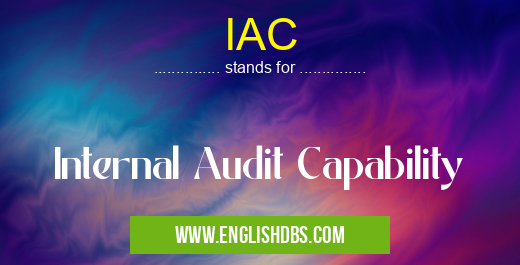What does IAC mean in AUDITING
IAC (Internal Audit Capability) refers to the ability of an organization's internal audit function to effectively assess and improve its internal control systems, risk management processes, and governance practices. A robust IAC is crucial for ensuring the accuracy and reliability of financial reporting, preventing fraud and misconduct, and promoting ethical conduct within the organization.

IAC meaning in Auditing in Business
IAC mostly used in an acronym Auditing in Category Business that means Internal Audit Capability
Shorthand: IAC,
Full Form: Internal Audit Capability
For more information of "Internal Audit Capability", see the section below.
Key Elements of IAC
IAC encompasses several key elements, including:
- Independence: Internal auditors must be independent from the activities they review to ensure objectivity and impartiality.
- Objectivity: Auditors must maintain a balanced and unbiased perspective when evaluating evidence and making recommendations.
- Professionalism: Auditors must adhere to ethical standards, professional codes of conduct, and best practices.
- Expertise: Auditors must possess the necessary knowledge, skills, and experience to effectively perform their duties.
- Resources: Organizations must provide adequate resources to support the internal audit function, including funding, staffing, and technology.
Benefits of a Strong IAC
A strong IAC provides numerous benefits to organizations, such as:
- Improved financial reporting quality: Internal audits help ensure that financial statements are accurate and reliable.
- Reduced risk of fraud and errors: Audits identify potential vulnerabilities and weaknesses in internal controls, reducing the likelihood of fraud or errors.
- Enhanced risk management: Internal auditors evaluate risk management processes and provide recommendations for improvement, helping organizations better manage risks.
- Improved governance: Internal audits assess the effectiveness of governance structures and practices, ensuring ethical decision-making and accountability.
- Increased stakeholder confidence: A strong IAC builds trust among stakeholders, including investors, customers, and regulators.
Essential Questions and Answers on Internal Audit Capability in "BUSINESS»AUDITING"
What is Internal Audit Capability (IAC)?
IAC refers to the ability of an organization's internal audit function to effectively fulfill its responsibilities and provide value to the organization. It encompasses the resources, skills, and processes necessary for the internal audit function to operate efficiently and effectively.
Why is IAC important?
Strong IAC is crucial because it:
- Ensures the effectiveness of internal audit activities
- Provides assurance to stakeholders on the integrity and reliability of financial reporting
- Contributes to the organization's risk management framework
- Assists in identifying and mitigating operational inefficiencies and fraud risks.
What are the key components of IAC?
Key components of IAC include:
- Skilled and experienced internal auditors with appropriate qualifications and certifications
- Adequate resources and support in terms of staffing, budget, and technology
- Effective audit processes and methodologies
- Independence and objectivity of the internal audit function
- Strong communication and reporting channels.
How can organizations improve their IAC?
To enhance IAC, organizations can:
- Invest in training and development for internal audit staff
- Provide adequate resources and support to the function
- Establish clear audit charters and policies
- Foster a culture of independence and objectivity
- Regularly assess and improve audit processes and practices.
What are the benefits of having strong IAC?
Benefits of strong IAC include:
- Improved financial reporting reliability
- Enhanced risk management
- Increased operational efficiency
- Reduced fraud risk
- Greater stakeholder confidence.
Final Words: IAC (Internal Audit Capability) is essential for organizations to maintain effective internal controls, manage risks, and promote ethical conduct. A robust IAC provides numerous benefits, including improved financial reporting quality, reduced risk of fraud, enhanced risk management, and increased stakeholder confidence. By investing in and developing their IAC, organizations can strengthen their operations, protect their assets, and achieve their objectives more effectively.
IAC also stands for: |
|
| All stands for IAC |
